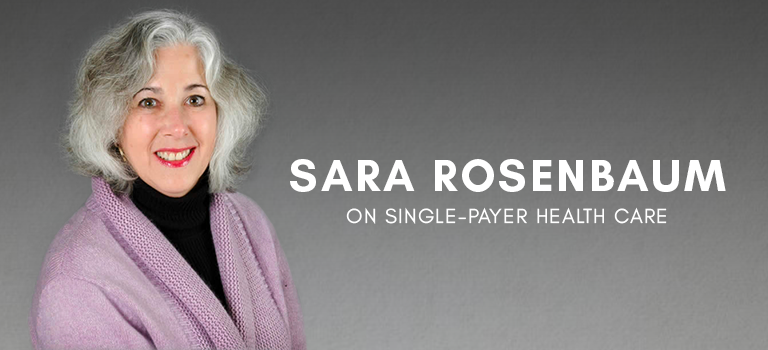Understanding Medicare for All

In mid-September, Senator Bernie Sanders of Vermont proposed a Medicare for All plan. Since then, more than 16 Democratic senators have come out in support of the single-payer health care plan. But what exactly is a single-payer system, and how feasible would it be for the United States to adopt it? To answer these questions and others, we sat down with Professor Sara Rosenbaum, the Harold and Jane Hirsh Professor of Health Law and Policy and Founding Chair of the Department of Health Policy at the Milken Institute School of Public Health. An honored teacher and scholar, Professor Rosenbaum has emphasized public engagement as a core element of her professional life, advising nineteen Congresses and six Presidential Administrations.
Could you briefly describe what is meant by “single-payer health care”?
There is no real single answer to that question, but I think that most people imagine “Medicare for All” when they imagine single-payer health care. That is when the government sets up an insurance system, and the government provides the insurance coverage. It may be administered by private insurers just like Medicare currently is, but the government is really responsible. It’s a federal system.
If the United States were to move to a single-payer system, would people’s individual plans start to look very different than what they are used to?
Not necessarily. We’d all get, at least in our basic plan, the same benefits. People might buy supplemental insurance, which Medicare beneficiaries already do, but the government is sort of the key player in the whole system. It not only would collect the money, but it also would provide the coverage. You could have a set of benefits that looks like what Medicaid covers today. But the key, I think, is that the benefits would be pretty broad, and the cost sharing would be much lower than it is today.
Is there still a role for private insurance in the single-payer system?
Absolutely. I mean, we have that today. Most people with Medicare have supplemental insurance, or they enroll in a Medicare advantage plan in which a private insurer offers you Medicare A, B and D and may offer you benefits that you don’t get through traditional Medicare.
What are some common misconceptions that you think Americans have about a single-payer system?
I think the biggest thing is the notion that single-payer somehow means a government takeover of health care. Medicare uses private hospitals, private doctors, private pharmacies, private insurance companies and private managed care companies. It’s simply the government insuring that everybody’s enrolled and everybody gets the same coverage. The system is run cheaply through several payroll taxes and government funding in lieu of having to pay your premiums directly.
What questions do you think people really should be asking about the United States potentially adopting a single-payer system?
I think as a basic matter, insurance is the easy part of the whole system of health care. I mean, it’s the thing that we shouldn’t have to think about, right? As opposed to who’s my doctor and making hard choices about your health care. Insurance should be a no brainer, and so the question is: What is the least expensive way for me to get some stable, good insurance coverage that keeps my out-of-pocket payment down, that keeps my premiums as low as possible and that I can’t lose over time?
I have no doubt that the least expensive way to accomplish this is by essentially extending the Medicare-like system to everybody and letting the government negotiate the payment rates with providers because that’s what drives a lot of the costs in health care. Instead of having to pay monthly premiums, and having our plan switch every time we move from one job to another or move out of state, just have everybody in one nationwide system.
Do you believe Medicare for All is feasible?
It’s certainly, technically, feasible. I don’t think the Medicare program we know today is politically feasible any longer, so I don’t think that a rapid move from what we have for “Medicare for All” is politically feasible. But I think that there will come a point in the United States when we have been able to get back to a world of government in which the choices that get made are the choices that are the best thing for society as a whole. Maybe we’ll get there. This issue has been with us for decades, so I think it will continue.
This interview was edited for clarity and brevity.


